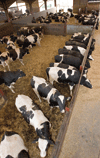Contract rearing offers benefits for farmers wanting to expand or consolidate

Many farmers are seeking to expand their enterprises to spread overheads, which puts pressure on existing buildings and land. At the same time, others are scaling back, freeing up valuable resources for potential contract rearing arrangements.
The benefits of contract rearing are considerable. It enables farmers to expand without big capital investment, while others can use their assets and create a guaranteed income.
The most common contract arrangement is heifer rearing, an ideal option for dairy producers wishing to give up milking, but still create an income from their assets. “If you get the right people for the job, there’s a lot to be said for it,” says Milk Development Council extension officer Chris Coxon.
“Rearing heifers is time consuming for dairy farmers, so contracting-out frees up time and buildings to concentrate on the milking herd.”
Most arrangements see the heifer rearer take delivery of the calf at about two weeks old, keeping it until about a month before it is due to calve itself, at which point it returns to the original farmer.
“You have to work out who’s responsible for various costs and jobs, such as AI, vaccination and feed,” says Mr Coxon. “It is worth drawing up a proper contract.
“Heifer rearing is an important job, which carries biosecurity risks, so I would go by personal recommendation when choosing who to work with,” says Mr Coxon.
Farmers considering contracting-out heifer rearing need to calculate what it costs to rear them and, therefore, what they can afford to pay someone else to do it for them. They also need to consider the opportunity cost of freeing-up time and buildings, which can then be used to expand the milking herd.
The same calculations must be done for any contract rearing arrangement, and while such agreements are not common in the beef sector, they can offer significant benefits.
“A lot of farms haven’t got the labour to rear calves,” says Clive Mahony, development manager at Meadow Quality, which specialises in calf rearing. Most rearers are former dairy or beef farmers with good housing facilities and are usually part of an integrated business like Meadow Quality or Blade Farming, which specialise in finishing dairy calves or beef crosses.
The benefit of contract finishing animals is the ability to do so without investing significant capital in your own stock. But low beef prices and high feed costs mean this sort of agreement can work only when finishers are offered a guaranteed profit, he adds. “In the medium to long term, I’m sure more of these arrangements will come about.”
In the sheep sector, it is rare for farmers to contract-out the rearing or finishing of lambs. But there are still opportunities for producers to take on neighbouring land and expand their own flocks. “A large number of sheep farmers have flocks of between 150 and 400 ewes as one of a number of enterprises,” says Claire Kingston from consultancy Laurence Gould. “Sheep on their own are unlikely to make a significant contribution to overheads on this scale and now is an ideal time to look at opportunities to increase flock size.”
By taking on neighbouring land, farmers can expand flock sizes, while the landowner or retiring farmer can release capital tied-up in machinery and reduce day-to-day management, but still retain the single payment and agricultural tax benefits, she says.
